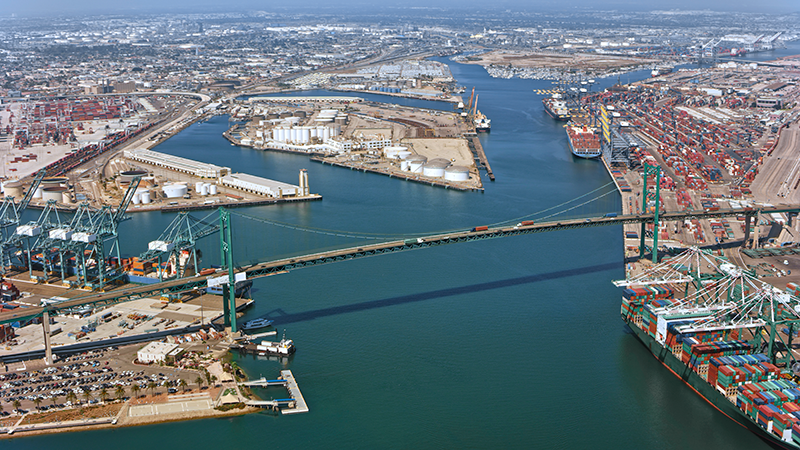UCLA Engineering Receives $21 Million Pledge from Chan Zuckerberg Initiative

iStock.com/simonkr
Among the UCLA projects being supported is SeaChange, a technology for removing carbon dioxide from sea water. The funds will enable the project team to demonstrate the process at the Port of Los Angeles.
Over the next three years, the gift will enable the institute to further develop promising technologies for carbon removal, bringing them from the lab to the field, and to test and validate the technologies at scale in real-world settings.
“The Chan Zuckerberg Initiative’s generous investment, coupled with Bruin innovation, will allow the revolutionary technologies being developed at the Institute for Carbon Management to become more accessible, affordable and sustainable for communities,” said UCLA Chancellor Gene Block. “This gift will help us build on the outstanding research, ingenuity and activism of UCLA students and faculty to strengthen our position as a leader when it comes to carbon management and the fight against climate change.”
“Scaling carbon removal to a consequential level will require massive advances in technology and innovation,” said CZI co-founders and co-CEOs Priscilla Chan and Mark Zuckerberg.
Founded in 2018 at the UCLA Samueli School of Engineering, the Institute for Carbon Management focuses on developing technologies to reduce carbon emissions and accelerate their commercialization. The institute’s director is Gaurav Sant, a professor of civil and environmental engineering, and of materials science and engineering. In April 2021, UCLA CarbonBuilt, a team led by Sant, became the first university team in the world to win an XPRIZE, earning a $7.5 million grand prize in the NRG COSIA Carbon XPRIZE global competition. Sant and his colleagues were honored for a UCLA-developed technology that turns carbon emissions into concrete.
“Scaling carbon removal to a consequential level will require massive advances in technology and innovation,” said CZI co-founders and co-CEOs Priscilla Chan and Mark Zuckerberg. “That’s why we’re supporting companies and researchers through a variety of financing methods.”
The gift will be allocated to ongoing projects at the Institute for Carbon Management, including:
- SeaChange, a process invented at UCLA that removes carbon dioxide dissolved in seawater. The energy-efficient approach has the potential to remove gigatons of carbon dioxide while producing green hydrogen, a clean fuel. The technology was recognized with the top prize at the 2021 Liveability Challenge. The funds will enable the SeaChange team to build and operate an advanced electrochemical flow-reactor, and to demonstrate the technology at the Port of Los Angeles, which will provide insights about how to reduce the costs of carbon removal while creating a blueprint for the accessible and equitable deployment of carbon dioxide-removal technologies for surrounding communities.
- A new approach to carbon dioxide removal using electrochemical direct air capture. The process, called x/44, separates carbon dioxide from the air. Typically, direct air capture is expensive and requires a significant amount of energy to separate carbon dioxide from the air. The process developed by researchers at the institute is less expensive than current methods and produces partially concentrated streams of carbon dioxide that can be used at large scale to produce low-carbon concrete, for example. The technique will advance carbon dioxide removal and industrial decarbonization while creating new uses for carbon dioxide.
- The development of a new way to produce portlandite, also known as calcium hydroxide. Portlandite is a replacement for limestone and cement for cement and concrete production, respectively. Cement and concrete production currently accounts for 8% of global carbon dioxide emissions. The Institute for Carbon Management will demonstrate a new electrochemical process for portlandite production that can be used to make carbon-negative concrete and help reduce carbon dioxide emissions associated with cement production by 65%. Instead of burning limestone or fossil fuels, the process requires only electricity, rock resources for calcium, and water.
“We are delighted to be collaborating with the Chan Zuckerberg Initiative on innovative carbon-management solutions,” said Jayathi Murthy.
“We are delighted to be collaborating with the Chan Zuckerberg Initiative on innovative carbon-management solutions,” said Jayathi Murthy, the Ronald and Valerie Sugar Dean of UCLA Samueli. “Climate change is one of the most pressing issues of our time, and CZI’s commitment to fund promising technologies to address climate change inspires hope. The Institute for Carbon Management has been doing incredible work since its inception. With this gift, we hope to continue advancing ready-to-market green technologies.”
The funding for the Institute for Carbon Management is part of $44 million from CZI to support cutting-edge climate change solutions.
“The support of the Chan Zuckerberg Initiative will be instrumental for practically demonstrating technological carbon management solutions at a meaningful scale,” said Sant, who is a Henry Samueli Fellow and a member of the California NanoSystems Institute at UCLA. “Catalytic action of this nature is foundational to create viable solutions that minimize the cost of carbon management and is a prerequisite to deploy technologies that could eventually be adopted the world over.”
